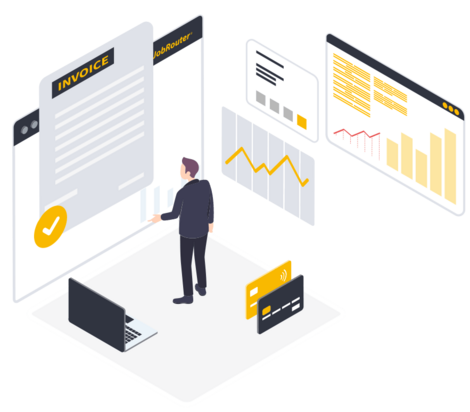
E-Invoicing - technology of the future?
- Last updated , created on
- Reading time
- Category Process automation insights
Everybody is talking about e-invoicing nowadays. Read on to find out what e-invoicing is all about, what e-invoicing obligations mean for companies, the benefits you can derive from e-invoices and much more.
Definition: What is e-invoicing?
The term e-invoicing relates to the issuing, sending, and receiving of electronic invoices within companies. It refers to both incoming and outgoing invoices.
E-invoices are invoices which are issued, sent, and received digitally as electronic documents. They can be represented by different data formats, for example PDF or XRechnung, an invoicing standard introduced by the German Federal Government. Companies must create e-invoices in a structured digital format so that they can be processed by automated electronic means.
How does electronic billing work?
Electronic Data Interchange (EDI) is the term used to describe the exchange of electronic data between companies. E-invoices form part of this exchange as electronic data formats. An e-invoicing system is essential in order to ensure that the transmission of e-invoices runs smoothly. This system transfers the electronic invoice to the receiving and sending parties’ systems.
E-Invoicing and SAP
Companies must use the European communication platform PEPPOL to send invoices electronically to government authorities. An established standard known as XRechnung is used for this purpose. In principle, this involves exchanging electronically processed invoicing data between your SAP system, the Federal Government’s central incoming invoice platform and the Federal Government itself. SAP is an ERP system in which you can only individually map upstream and downstream stages in the e-invoicing process onto your individual requirements with a great deal of know-how. This is why more and more companies are using workflow management systems with a low-code approach and linking SAP to their systems. This means that e-invoices can be processed faster and more easily in your SAP system.
The advantages of e-invoicing
Reduced costs
Analog invoice processing is often expensive. Companies save costs with e-invoices and digital invoice processing, particularly in terms of printing and distribution.
Increased security
E-invoicing and legally compliant invoice transmission significantly increase the security of data transmission.
Reduced time and effort
E-invoicing speeds up invoice processing significantly, as electronic invoices can be delivered faster and processed automatically.
What is the e-invoicing obligation all about?
Government authorities, such as public authorities, municipalities, and insurers, have been obliged to use e-invoicing since November 2020. Electronic invoicing is standard. In addition, electronic invoicing has received the same legal status as analog invoicing since 2011.

What is the e-invoicing obligation all about?
Government authorities, such as public authorities, municipalities, and insurers, have been obliged to use e-invoicing since November 2020. Electronic invoicing is standard. In addition, electronic invoicing has received the same legal status as analog invoicing since 2011.
How to switch to e-invoicing within your company
For many companies, switching to e-invoicing is a challenge. You should therefore pay close attention at the outset to the technical and corporate requirements for e-invoices within the company.
The main requirements for e-invoicing are:
- Incoming invoice processing
- Digital invoice processing
- Digital archive
Before implementing e-invoicing in your company, you should go through the different project planning phases. These involve, in particular, analyzing existing processes, defining goals, and selecting software tools.
Conclusion: E-invoicing is fundamental
E-invoicing will become even more important in the future. If you implement electronic invoice processing successfully with e-invoices, you will save time, costs and effort, increase security, and promote digitalization within your company. E-invoicing is particularly important when invoicing government authorities, as XRechnung is mandatory in this context.
The JobRouter® digitalization platform allows you to implement e-invoicing directly within your company with a focus on the future. The software links workflow automation with agile document management on a unique platform. Third-party systems can be connected via different interfaces, including SAP, as required.